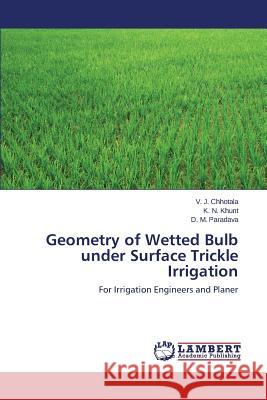Geometry of Wetted Bulb under Surface Trickle Irrigation » książka
Geometry of Wetted Bulb under Surface Trickle Irrigation
ISBN-13: 9783659612183 / Angielski / Miękka / 2014 / 100 str.
The volume of irrigation have effect on wet bulb which is important parameters in selection of emitter.The distance of outlets, the flow intensity and period of irrigation should be designed as though the volume of wetted soil close to the volume of root plant. Thus, the observation of form and volume of wetted soil under emitters in order to supplying the demand of plant water, optimistic management and increasing of irrigation efficiency is necessary. For knowing that, whether the referred emitter soaks the Favorable area or not, the concluded wet pattern is needed so that on basis of these patterns, the distance among the emitters could be determined. Keeping in view the above facts, the present study has been planned for the objectives 1)To determine the pressure discharge relationship and coefficient of manufacturing variations for different capacity emitters 2)To determine the wetting geometry under dripper for different emitter flow rates and volume of applications 3)To determine the wetting geometry under dripper for different emitter flow rates and volume of applications 4)To develop the mathematical model for the wetting geometry under dripper.
The volume of irrigation have effect on wet bulb which is important parameters in selection of emitter.The distance of outlets, the flow intensity and period of irrigation should be designed as though the volume of wetted soil close to the volume of root plant. Thus, the observation of form and volume of wetted soil under emitters in order to supplying the demand of plant water, optimistic management and increasing of irrigation efficiency is necessary. For knowing that, whether the referred emitter soaks the Favorable area or not, the concluded wet pattern is needed so that on basis of these patterns, the distance among the emitters could be determined. Keeping in view the above facts, the present study has been planned for the objectives 1)To determine the pressure discharge relationship and coefficient of manufacturing variations for different capacity emitters 2)To determine the wetting geometry under dripper for different emitter flow rates and volume of applications 3)To determine the wetting geometry under dripper for different emitter flow rates and volume of applications 4)To develop the mathematical model for the wetting geometry under dripper.











